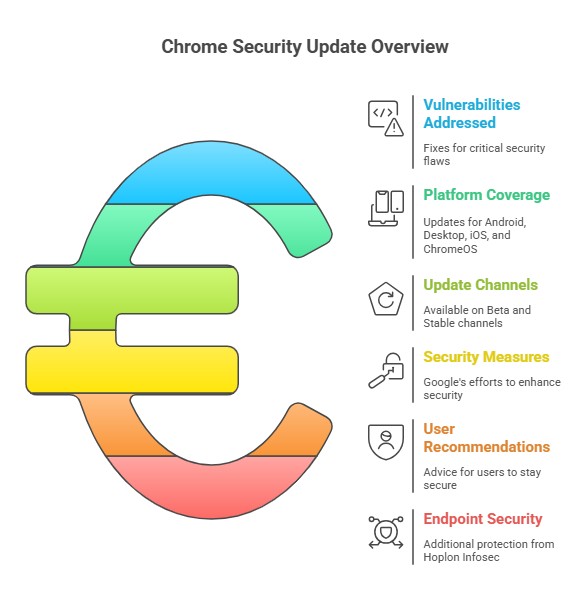Chrome Security Update 2025: Critical Patch Protects Against Browser Crashes

Hoplon InfoSec
02 Oct, 2025
Most people probably open Chrome without thinking about it when they wake up. It's that tool we all use for everything, from checking emails and paying bills to scrolling through social media and booking a flight. We hardly notice that it's working in the background. But in 2025, Google released an update that made the news for all the right reasons.
The most recent update for Google Chrome 2025 fixed 21 different security holes, not just one or two. Some of these holes were small, like the kinds of bugs that make things slow down or crash at the worst times. Some were much worse. These vulnerabilities could allow hackers to take control of your browser, intentionally crash it, or worse, infiltrate your computer while you browse.
This incident isn't just another update that gets added to your system. It reminds us how quickly attackers look for weaknesses and how even a tool we use every day can suddenly become dangerous.
What Made the Update Happen?
Every year, Chrome undergoes a plethora of minor changes, but the urgency behind this one was evident. Researchers in security and Google's own team found several holes that were more than just theoretical risks. Hackers were already testing some of these vulnerabilities in the real world.
Imagine Chrome as a home. If the back door lock is broken, a skilled person could get in through the closed windows. This update was like a team of locksmiths rushing to strengthen all the doors and windows at once.
The 21 Flaws' Scope
The 2025 update for Google Chrome was enormous. We identified these 21 problems in various parts of the browser. Some had to do with how memory was handled, others had to do with how JavaScript ran inside the V8 engine, and still others had to do with extensions and rendering.
The memory bugs got the most attention. They may seem harmless, but they are often the first steps attackers take to run commands or crash an app. Losing the blueprint for a building is like making a mistake in memory management. Anyone who finds it can use it in a detrimental way.

Simple explanations of critical weaknesses
Some of the weaknesses were more serious than others. These weaknesses could do more than just freeze your browser. They could be used to run codes that weren't allowed. Picture it like clicking on a simple link, and in the background, the page sends hidden instructions straight into your system. That's why this patch was crucial.
A crash in your browser might seem random or annoying. But if the crash was planned, it could be hiding something more dangerous.
How do scientists identify these bugs?
The intriguing part is how these problems are found in the first place. Google runs one of the most generous bug bounty programs. People who are not part of Google but are interested in finding flaws in Chrome spend hours poking around in the code.
Some people use automated fuzzing tools, which send random input to the browser to see what breaks. Some people dive into codes by hand and test strange situations. It took months of discoveries like these to make the 2025 update for Google Chrome. And Google pays out when a researcher finds something wrong, sometimes even thousands of dollars for one bug.
The Attacker's Playbook
Let's think about how someone could really take advantage of these weaknesses. One way is easy: make a bad website with code that has been carefully written. You, the unsuspecting user, go to the site, and without you knowing it, the site takes advantage of Chrome's weaknesses. Your browser closes all of a sudden. You could just shrug, open it again, and keep going. However, it's possible that during that brief crash, the system implemented incorrect instructions.
This is why the fixes were crucial. Attackers don't have to knock on the door as loudly anymore. They just slip in when you're not paying attention.

Google's Quick Action
Google didn't keep the information to itself, which is a good thing. The company quickly released patches and told everyone to update right away. They even acknowledged that they were already exploiting some of these issues for their own benefit. Becoming honest is important. Software vendors often fix security holes without telling users how close they were to real danger.
By pushing the Google Chrome update 2025 globally and making noise about it, Google reminded us that updates are less about “new features” and more about staying safe.
Why Chrome Is So Often the Target?
The most popular browser in the world is Chrome. That's the short answer. Attackers love numbers, and billions of people use Chrome every day. Why go after niche software when you can go after the tool that almost everyone has?
Another reason is that Chrome is complicated. It works with apps, devices, Google accounts, and extensions. There is a chance that each connection point is weak. Convenience comes with a price.
Things You and I Can Learn
What does this mean for people who use it every day? First lesson: Don't ignore the update message. A lot of us put off updates because we're busy with other things. But putting things off can leave your system open.
Second lesson: it's still important to browse safely. Even with patches, another bug lurks in the shadows. Being careful about what you download and staying away from sketchy sites can greatly lower your risks.
Why Browser Security Will Be More Important in 2025
Ten years ago, you probably only used your browser to read the news or check your email. Everything in your digital life goes through it now: online banking, job applications, streaming, medical portals, and more. That makes it the most valuable target for hackers.
The Google Chrome update in 2025 wasn't just a patch, though. It was a barrier between you and a possible financial or personal disaster.
Reviewing Old Updates
Chrome updates are nothing new, but it's not common for one to fix this many security holes at once. The size of the patch shows how hard attackers are working. A few years ago, a single cycle might fix five to ten bugs. Now we're looking at 21 all at once.
That means the fight is only going to get worse.
Other Browsers in the Same Fight
You might think that this is only a problem with Chrome, but Firefox and Microsoft Edge have the same problems. Edge is built on Chromium, which is the same base code that Chrome uses. Because of this, many of these security holes affect both browsers. When one browser receives a patch, other browsers often receive it very quickly.
It has a domino effect on all the browsers.
A Little Crash with Big Effects
A friend once told me that his browser crashed while he was paying his bills online. He thought it was just a small problem at the time. However, when you consider vulnerabilities like these, it becomes evident how simple it would be to exploit such a situation.
If attackers had the ability to manipulate that seemingly harmless "freeze," it might have resulted in a more significant issue.
The Bigger Picture of Cybersecurity
This patch is part of a bigger picture. Attacks are getting faster and more automated. Now, organized groups are looking for flaws on a large scale, sometimes with the help of AI-powered tools. It's been a long time since hackers worked alone in basements.
The 2025 update for Google Chrome is Google's answer to this new era. It fixes bugs quickly and broadly, and it stays one step ahead of enemies who are getting smarter.
What Analysts Are Saying
Experts in the field are giving their opinions. A recent Trend Micro report said that attacks that take advantage of memory have gone up a lot this year. One analyst put it best when they said, "The browser has become the modern operating system." You control the user if you control it.
That direct statement helps us understand why these weaknesses are vital.
The Danger of Not Paying Attention to Updates
Many people put off updates because they think, "It's just a browser; how bad can it be?" But not paying attention to them is like leaving your car unlocked on a busy street. Most people won't try the handle, but one person who really wants to might. That one time could do a lot of damage.
What Will Happen in the Future
Will Chrome ever be perfect? Not likely. There are bugs in all software. The only difference is how quickly they are found and fixed. Users will be safe as long as Google keeps up this rapid pace.
But we also need to do our part as users: update quickly and remember that security is everyone's job.
A Reminder We Can't Ignore
The 2025 update for Google Chrome is more than just a bug fix. It's a reminder that the internet we use every day is weak and always under attack. The browser is no longer just a window to the internet; it's also the lock, the gate, and occasionally the vault.
It's not about being paranoid to keep it strong. It's all about habits. Clicking "update," being smart about how you browse, and knowing that security is an ongoing process, not a one-time fix.
Sources you can trust.
The Official Security Blog for Google Chrome
Summary: In late September and early October 2025, Google released Chrome Beta 142 for Android, Desktop, and iOS, as well as Chrome 141 for stable channels. The updates are mostly about improving performance, stability, and security. They also fix 21 serious security holes. People are told to update their browsers right away and let the company know if they have any problems so they can stay safe.
Quote from a research company
Forrester Research says that "Web browsers have become the most targeted enterprise software in 2025, even more than email clients." Keeping them updated is no longer optional but critical to organizational resilience.”
Suggestions for the Hoplon Insight Box
· As soon as Chrome updates are available, install them.
· Only use extensions from developers you trust.
· Allow all of the devices on your network to update automatically.
· Combine strong endpoint protection with browser security for a layered defense.
Hoplon Infosec’s Endpoint Security protects your devices from browser vulnerabilities like those fixed in the google chrome update 2025, keeping your systems safe from attacks.
Follow us on X (Twitter) and LinkedIn for more cybersecurity news and updates. Stay connected on YouTube, Facebook, and Instagram as well. At Hoplon Infosec, we’re committed to securing your digital world.
Share this :